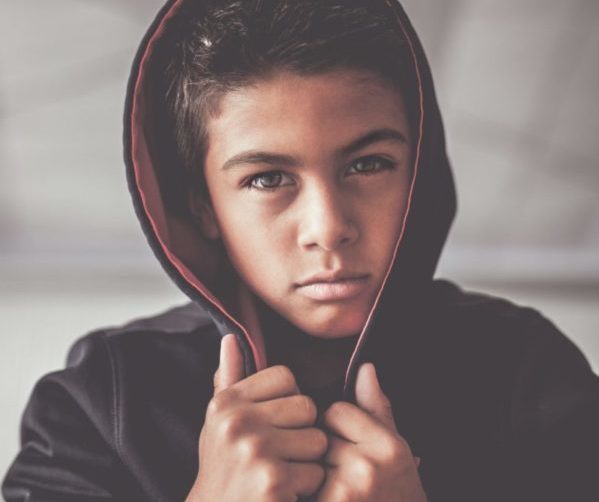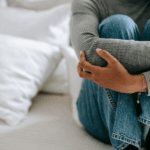
Jackson is 11. His anxiety about eating food in front of other people takes up a huge part of his day. His anxiety escalates as recess and lunchtime approach at school, but he feels equally anxious about being watched eating at home with his family. Because anxiety feels so awful, the natural response is to avoid whatever is causing it. In Jackson’s case, eating in public. There are countless days at school he hardly eats a thing. He comes home famished and goes straight to his bedroom to eat in privacy.
No matter how anxiety is impacting one of our children, it’s awfully hard to see them suffering and to know exactly how to help. My heart goes out to you if you, too, are the parent of an anxious child or teen. It really is a challenge that impacts everyone and it’s not something we’re prepared or equipped for no matter how old our children are. Irrespective of how anxiety impacts your child, as a parent, you are the best placed to help. In Jackson’s case, as in all childhood anxiety, parents play an important role in supporting anxious kids to understand what’s happening, manage their experience of anxiety and subsequent actions, and connecting with professional help when anxiety is getting in the way of day-to-day life.
Jackson feels like he’s being watched closely when he eats and that he’s being judged at the same time. What often happens under these circumstances is that when a child with Jackson’s particular type of anxiety does eat in front of others, his classmates and friends will be more inclined to watch because they don’t usually see him eat in front of them often. Teachers and loving adults in his life might also watch to see how much he eats because they worry he’s not getting the nutrition he needs. It’s completely unintentional and without judgement but it makes sense that these responses can, in Jackson’s mind, confirm what he already thinks. Everyone’s watching.
When one of our kids is displaying anxiety symptoms in this way (or any way) it makes us as parents feel anxious too. It’s completely natural for us to want to know how our kids are going, to monitor their symptoms, to check in regularly and to help. It puts us, as parents, in a tricky position when we know any checking in or watching can feed into the anxiety our kids are feeling.
When people are anxious that something they do will be evaluated by others in a negative way, it falls into the category of social anxiety. For children, teens and adults who experience social anxiety, there are fears of being judged, being criticised, being laughed at or humiliated in front of others, even in the most ordinary, everyday situations.
Because of the different ways anxiety impacts physiology, when it shows up it can cause shakiness, a flushed face, and an upset stomach among other symptoms. Shakiness might result in the spilling of food or drink, visibly shaky hands and maybe stains on clothing from fallen food. Any one of these alone is enough to compel anyone feeling this way to want to avoid eating in public all together. This creates a cycle that serves to reinforce avoidance behaviour.
When it comes to avoidance behaviour, the reinforcing nature of it can make it a hard cycle to break, but it absolutely can be done. It takes time, and needs to be done slowly and, in Jackson’s case, with professional guidance and support.
Helping any anxious child or teen to overcome avoidance relies on what’s called ‘exposure’. But rather than a ‘sink or swim approach’, exposure needs to be gradual. Jackson might start by eating something small in front of one person. It might even be one mouthful to begin with, and in the company of a loving, supportive, understanding adult.
With the support of a psychologist or other mental health professional, Jackson and his family can come up with a plan that steps him closer and closer to the ultimate goal, being able to comfortably eat in public.
Whenever we’re working with exposure it’s wonderful to have anxious kids and teens contribute to the plan, and to also come up with ways to celebrate wins along the way.
At the same time as you’re supporting your anxious child to move forward with gradual exposure, encouraging them to apply their anxiety management skills is important.
- Strong breathing with a pause between the inhalation and exhalation, and a long slow exhale helps to show their brains they’re safe
- Paying attention to 10 things they can see around them helps to bring their attention to the present and ground them in an anxious moment
- Remembering that they can feel anxious but can actually still do what matters in the moment. Remind them they have the courage within them to feel anxious and take this small step forward.
As with any new skill, introducing it when kids and teens are relaxed is important. Regular practice helps create new pathways in their brain that get stronger with repetition. These skills then become embedded, and can be called on when anxiety rises.
Hang in there, you’re doing a brilliant job of looking after your anxious child or teen, and they are just so lucky to have you there looking out for them. Please make sure you look after yourself too.
Jodi x

share the love
[Sassy_Social_Share]

about
Jodi is on a mission to elevate mental health and wellbeing in families, classrooms and workplaces.


free 5-day
Calm your anxious brain
mini course

Recent Posts

free 5-day
Calm your anxious brain
mini course
Sign up for my free 5-day ‘Calm Your Anxious Brain’ email mini-course. Put the strategies into place for yourself, light the way for your kids, or do both.






